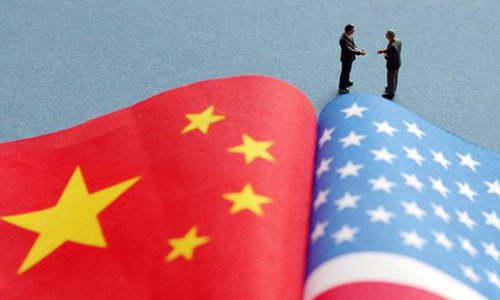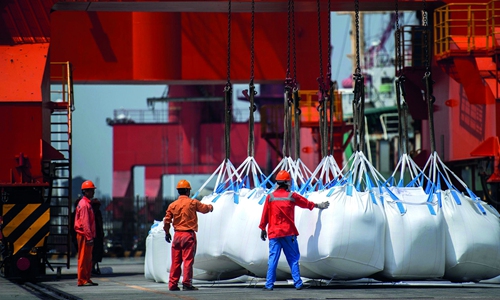China sets no timetable for clinching trade deal with US: FM
Trump's 'no deadline' a bluff for quick trade agreement

Chinese and US trade officials make attempt at striking a trade deal to defuse an increasingly bruising trade war that has rattled global markets and presented mounting challenges to both economies. Photo: VCG
China has no timetable for reaching a trade deal with the US or not doing so, a Chinese Foreign Ministry spokesperson said on Wednesday, reiterating that trade talks should be based on equality and mutual respect, while a result should be of mutual benefit and accepted by both sides.
"The US repeatedly says 'a trade deal is coming,' 'no deal,' 'hope when to reach a deal,' 'I don't want a deal.'" But China never says these things, right?" Hua Chunying, a spokesperson for the Foreign Ministry, told a briefing on Wednesday.
Hua said China's stance on the trade issue is constant and clear. "We believe a trade war doesn't conform to any side's interests. Amid globalization, the interests of China and the US are highly intertwined and their cooperation is key to a global economic recovery and growth," she said, noting that the whole world hopes the two countries can reach a win-win trade deal through talks.
However, if faced with unilateralism, protectionism and trade hegemony, China has no choice but to take resolute and decisive measures to protect its justified and legitimate rights, she said.
Hua's comment came after US President Donald Trump indicated that trade talks with China may drag on after the US presidential election in November 2020.
"I have no deadline, no," Trump told reporters in London, Reuters reported. "In some ways, I like the idea of waiting until after the election for the China deal. But they want to make a deal now, and we'll see whether or not the deal's going to be right; it's got to be right," he said.
Trump's "no deadline" comment is a bluff that he's using to threaten China to make concessions so as to fit to his political purposes, Huo Jianguo, vice chairman of the China Society for World Trade Organization Studies, told the Global Times.

Photo:VCG
Following Trump's remarks, the Dow Jones Industrial Average fell more than 1 percent to 27,502.81. The S&P 500 was down 0.66 percent to 3,093.20.
By contrast, Chinese A-share markets remained stable. Although the Shanghai Composite Index slid 0.23 percent to 2,878.12 on Wednesday, the index in Shenzhen climbed 0.31 percent to 9,687.95 points.
China has sufficient strength and has made full preparations, so China needs not to panic over Trump's remarks, Mei Xinyu, a research fellow at the Ministry of Commerce's Chinese Academy of International Trade and Economic Cooperation, told the Global Times.
Compared with the initial period of the trade war about 18 months ago, China has become more composed amid the steady improvement in its economic fundamentals.
China's purchasing managers' index for the manufacturing sector strengthened to expansion at 50.2 in November from October's 49.3.
However, the US has seen it manufacturing PMI contract for the fourth straight month in November at 48.1, which was 0.2 point lower than the previous month, due to declines in orders and inventories, according to data published by the Institute for Supply Management.
Trump is well aware of the impending risks of a US recession and therefore repeatedly blames the US Federal Reserve for not working out the easier policy he wants, Hu Qimu, senior fellow of Sinosteel Economic Research Institute, told the Global Times.
On Monday, Trump blamed the Fed again, tweeting that its "ridiculous policies" held back US manufacturers.
US companies rely on the huge Chinese market, according to Hua.
"It's ridiculous [to say that China's prosperity relies on US money]," she said, noting that US investment of a little over $80 billion in China only represents about 4 percent of the nation's total foreign direct investment since 1987.
"What benefits has the US gained from cooperating with China? Recently, 97 percent of the interviewed US companies said they made profits by doing business with China," she said.